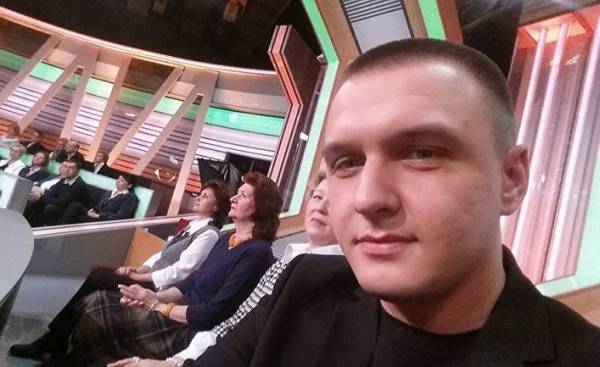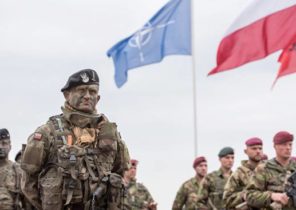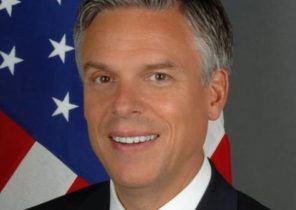
He regularly appears in the Russian media in the role of a Polish journalist who promotes “the Polish point of view” and is ready to defend it in the literal sense with fists. However, experts and critics argue that it is not so much to protect the good name of Poland, as acts a tool of Kremlin propaganda.
This time the stumbling block was the story. In the program “the meeting Place”, which broadcasts live popular Pro-Kremlin TV channel NTV, the invited guests discussed world war II and the role of the red army. Chief editor of the project PolitRussia. EN Ruslan Ostashko was outraged by the fact that some, like those present in the Studio, Mateychuk pole Tomasz (Tomasz Maciejczuk), have the audacity to compare communism with fascism, while his ancestors “gave his life for their freedom.”
“Ostashko said that if I insult his ancestors and call them red fascists, then he will stuff my face, but I will not be intimidated” — describes the situation in a conversation with Wirtualna Polska, Mateychuk. In response, he immediately blurted out, “Your grandparents — red fascists”. Ostashko, stood up, walked to the pole and hit him, whereupon a fight ensued. Mateychuk, claims that he came out of it a winner. “No, Ostashko or smartly did not hit me in the face. I hit him three times, his broken face” — he wrote then on the portal Wykop.pl.
Veteran Russian talk show
The Russians are familiar with the uncompromising position of Macacua and scandals, which her arise. The pole became a frequent guest of Russian TV programmes, which, according to him, he is often found with a negative attitude to Poland and protested against it.
“Propaganda confirms that Poland is a bad poles killed Jews during the war, and the soldiers of the home Army were Nazis. The Russians put our country an example of how terrible the EU is, what we have is poverty. When I try to put forward counter-arguments, the response is very sharp,” says Mateychuk.
His arguments sometimes sound original. In November the program “Right to vote” on TVC channel, Mateychuk, not choosing expressions, and compared the living conditions in Russia and the EU, saying that Ukrainians choose integration with Europe, because they unlike the Russians “don’t want to live in ***”. The pass also ended in a fight. The journalist believes that the use of dramatic expression is necessary, because “Russian talk-show is inconsiderate and tough fight, not a debate of the cultural and reasonable poles.”
Duty foreign guests
The antics and arguments of Maracucha not meet however, the approval of his colleagues and experts, who believe the journalist an instrument of the Kremlin propaganda.
“Russian talk show is from beginning to end is carefully orchestrated performances. There everything is under control, random people aren’t invited. Mateychuk fits into the role of “Polish fascists” or “Polish Russophobia”. Its role is to put forward a controversial thesis, to offend the historic memory of Russia and to reinforce the image that draws the Kremlin”, — says Director of the Warsaw Center for the study of propaganda and disinformation Adam Lelonek (Adam Lelonek). He stressed that the Russian transfer frequently invited overseas guests. Most often it is the marginal figures from different countries, the purpose of which is to depending on the situation to support some aspect of the official discourse or, conversely, to say something outrageous and put those who disagree with the Kremlin line, fanatical Russophobes.
At times the Russians could not find a suitable foreign visitor, but Russian propaganda is easy out of the situation. Recently created a sensation story, “Greg Weiner” — American journalist, appeared in a talk show state of the First channel and turned out to not be an American and not a journalist and the Russian businessman who lived for some time in new York.
Says Lelonek, foreign guests of the Russian television almost always get for speaking fees. Mateychuk confirms that he paid for the flights, taxi and accommodation, however, denies that he was paid for the appearance before the cameras. “Perhaps Mazacam all true, but usually the Russians pay for such performances. Previously, it was 200 euros, now we are talking about the amount of 500-1000 euros. I know this from conversations with Russian and Ukrainian journalists,” says Lelonek.
He was echoed by the journalist of the portal Eastbook.eu Masha Makarova. She says, Muzychuk plays in the Russian propaganda, the role of the “regular pole”. “The actions of Maracucha show that he decided to closely associate themselves with Russia and its media, particularly those that promote the Kremlin’s discourse. He’s just doing what is expected of him, makes this,” — said in an interview with Wirtualna Polska Makarov.
The message to ordinary Russians
He Mateychuk rejects all accusations and says that, speaking on Russian television, he represents an alternative point of view and carries its message to millions of Russians.
“To speak in these programs is necessary because many Russians do not agree with the thesis of Russian propaganda. I feel a lot of support especially from young people. They understand that TV reality is at odds with reality,” he explains. This, however, does not convince critics of Maracucha.
“Even if part of the audience agrees with his thesis, this does not mean that he is doing a good thing for Poland. These transmissions each plays a clearly defined role, which should produce a specific effect, and to introduce such men as Mateychuk, in the form of independent commentators, says Lelonek. — Mateychuk not fighting the regime, he is part of it”.
Makarov notes that, Muzychuk has really gained some popularity among part of the supporters of the Russian opposition, however, that, in her opinion, the alarming news. “I am very concerned that some Russian opposition figures believe he is an independent journalist. His work has nothing to do with journalism, he’s just found in Russia, its “plot”, which provides him with money and fame. The Russians, who admire Mazacam should read his biography,” she says.
From a volunteer to a fighter Bandera
His biography is really full of twists and turns. Mateychuk, began his career in nationalist circles, and now calls himself a national-Democrat. After the attack Russia to Ukraine, he was actively engaged in assistance to the Ukrainian refugees and the fighting in the Donbass military. He also covered the events at the front, giving interviews to various publications (including foreign, as the newspaper Die Zeit), and became famous for the exchange of threats with the infamous militants Givi and Motorola.
Pretty quickly, Muzychuk made another u-turn and turned from a fierce defender of the Ukrainians in the person, revealing manifestations of Nazism and banderizma among warring Russian volunteers. At the same time he began to accuse the Polish journalists that they ignored this topic. Now colleagues Maracucha say they do not want to have anything to do with him, considering that he’s trying to buy popularity at their expense. Working with him has ceased the Fund “Open dialogue” from which a journalist had to distribute in the Donbass sent humanitarian assistance. The reason “numerous problems with communication and gaps in the documents confirming the transfer of care.”
In April of last year, Kiev has announced Maracucha persona non grata, banning him for five years to enter the Ukraine. In the version of the journalist, it’s a personal vendetta of the interior Minister Pavlo Klimkin. Muzychuk during your stay in Amsterdam accused him of the fact that the Ukrainian government is a hypocritical stance against homosexuals. According to Ukrainian media, the pole was doing in Holland that was called to vote in a referendum against ratification of the Association agreement with Ukraine.
“I asked the editor of “the Ukrainian truth” to substantiate the charges. Of course, I evidence is not provided, since they do not exist,” explains Mateychuk. Despite the circumstances, he says he has no regrets about his activity in Ukraine. Poland, he said, is interested in how to support Kiev in its confrontation with Moscow.
But if Poland is interested in his speeches? As suggested by Adam Lelonek, the situation is unambiguous. “I believe that it should not be called defender of Poland or “Polish approach to history.” In these transmissions it is not our country, and himself, and (consciously or unconsciously) harm Poland, securing hostile to us in discourse,” the expert concludes.







